When I was in my teens and traveling on the school bus in the mornings, I would often sit across from my friend Bruce. We were both farm children and thus had lots of chores to 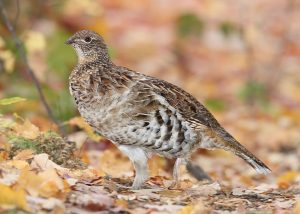 finish every night, but he had an additional hobby that occupied a lot of his time and mental energy. Bruce liked to hunt. In the fall his favourite animal to hunt was partridge, although it occurs to me now that he likely settled on them by default, since deer licenses were more difficult to procure and moose licenses impossible.
finish every night, but he had an additional hobby that occupied a lot of his time and mental energy. Bruce liked to hunt. In the fall his favourite animal to hunt was partridge, although it occurs to me now that he likely settled on them by default, since deer licenses were more difficult to procure and moose licenses impossible.
The partridge, or more properly, the ruffed grouse, can be heard drumming in the spring as part of their breeding ritual, and often can be sighted mostly buried in the snow on cold winter nights. In the fall, many people hunt them for meat, and 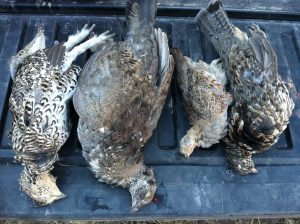 Bruce was no exception. What that meant for our bus conversations on crisp fall mornings was that Bruce would supply an update of birds killed and how that affected his total. One fall he had three or four kills to report every day, and more on Mondays. When his count was almost forty birds by the end of the season his pleasure was evident in his voice.
Bruce was no exception. What that meant for our bus conversations on crisp fall mornings was that Bruce would supply an update of birds killed and how that affected his total. One fall he had three or four kills to report every day, and more on Mondays. When his count was almost forty birds by the end of the season his pleasure was evident in his voice.
I didn’t think much about Bruce’s nightly occupation, although I was impressed by his ability to kill the birds with only a 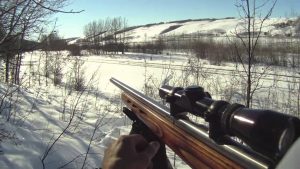 22 calibre single-shot rifle. It was only in the morning conversations of the following fall did I pause to think what his kill count meant. Bruce began the season complaining that he couldn’t find any grouse at all. He hunted beyond the region he’d decimated the year before, but he was surprised that there were none to be had. After a few weeks of the same refrain, he concluded that it must be a bad year for grouse. It was at this point that I finally put the information together and suggested that perhaps he’d killed so many the year before that he’d drastically affected the population of local birds.
22 calibre single-shot rifle. It was only in the morning conversations of the following fall did I pause to think what his kill count meant. Bruce began the season complaining that he couldn’t find any grouse at all. He hunted beyond the region he’d decimated the year before, but he was surprised that there were none to be had. After a few weeks of the same refrain, he concluded that it must be a bad year for grouse. It was at this point that I finally put the information together and suggested that perhaps he’d killed so many the year before that he’d drastically affected the population of local birds.
Bruce vehemently denied that this was the case, and although he had little to offer beyond his insistence and statements about how hunting doesn’t affect the amount of animals, his emotional attachment to the question seemed worth prodding. I asked him the same question in a few different ways, but he remained fixed in his original declaration.
I might have reacted to his statement with more scepticism because I’d heard the same reasoning—such as it was—before. When I was younger I recall my foster father saying that the local creek used to have so many fish that his father would go in the hour or so that remained between finishing his chores and dark and catch several dozen fish. 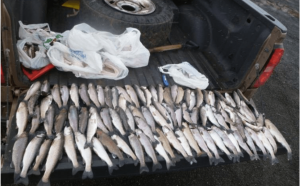 I remember I asked him to repeat: several dozen fish? He said that his father would return with enough trout for several meals and that they would take the bait almost as soon as he’d thrown the hook into the water. Once, he told me, his father had caught eleven dozen.
I remember I asked him to repeat: several dozen fish? He said that his father would return with enough trout for several meals and that they would take the bait almost as soon as he’d thrown the hook into the water. Once, he told me, his father had caught eleven dozen.
The import of this story would always be a lament about how there were no more fish in the streams. When I suggested that perhaps his father’s greed had taken its toll on the fish stocks and therefore they were unable to maintain their numbers, he rejected the insinuation. “It’s the people coming from town,” he said. “There were lots of fish before there were cars and people started to come from town. They’ve fished out the stream.”
Like the anti-vaxxer, he used the era of the loss as his principal indicator and then examined what else was going on the same time. The anti-vaxxers say there is a link between autism and vaccines because early diagnosis is contemporaneous with the application of school-aged vaccines. For them, perhaps because their knowledge of medical science is limited, they immediately presume the two are linked. The growth and loss of the baby teeth also happen at the same time, as well as walking more, and the entrance into school, but for the anti-vaxxers one arbitrary event is of more importance than all the rest. Cars were in widespread use just as farmers like my foster father’s dad began to fish out the stream, so it must be the fault of the cars.
What hovers behind these claims is also worth examining. All of these cases point to a wish to abdicate from responsibility for the change in fortune. In the case of the diagnosis of autism, no one would blame the parent, but parental guilt is a common and powerful phenomenon. When medical science has so far refused to supply an explanation—if we look at it in their terms—then in their fear that they might be responsible, they reach for a likely candidate. Their guilt over their own unfounded fears of culpability combine with their anger at medical science for not answering their questions, or curing their child, into a stew of anger-fueled anti-science accusation that those unable or unwilling to help must somehow be responsible.
Likewise, my foster father deliberately does not find his own fishing history combined with that of his father’s convincing enough, so he must cast the net further when he wants to locate who is responsible for declining fish stocks. Otherwise, he has to take responsibility for destroying a valuable resource out of thoughtless greed. Bruce didn’t have people from town to blame, since he hunted on his own property and knew no others were there to kill the grouse he was unable to kill himself. He was left with a generalized other: the whims of mother nature. “It’s a bad year,” he would say to himself while he walked the same forest that no longer fluttered with fat partridges in the fall. If the bad year was merely a passing incidence, that meant that the next year would be better, and more importantly, that meant he wasn’t to blame for the lack of grouse.
Before Bruce was able to hunt, when he was much younger, a distant relative had been hunting ducks along the dead water that curled near Bruce’s house. For the purpose, the man had his gun lying beneath his feet while he rowed the homemade boat 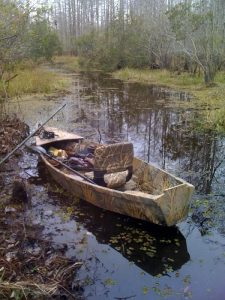 back and forth where the water was still enough to encourage ducks to settle. Once he was done hunting for the night, he went to shore and pulled the boat onto the bank. The boat had been made from two old car hoods welded together, so it wasn’t heavy, although many pointed out later that meant it had a raised bump of weld across its centre. While he was pulling the boat from the water, his gun reportedly slid from one end of the boat to the other and went off, shooting him dead through the end of the boat.
back and forth where the water was still enough to encourage ducks to settle. Once he was done hunting for the night, he went to shore and pulled the boat onto the bank. The boat had been made from two old car hoods welded together, so it wasn’t heavy, although many pointed out later that meant it had a raised bump of weld across its centre. While he was pulling the boat from the water, his gun reportedly slid from one end of the boat to the other and went off, shooting him dead through the end of the boat.
For the locals, who found it impossible to blame the man who’d been so careless as to move a boat with a loaded shotgun pointed at his chest, the answer was obvious. Like the anti-vaxxers, my foster father and Bruce, they pointed to another agency. The gun slipped along the boat, they explained, and when it hit the weld, it went off. The import of their explanation was that no one could have predicted or been responsible for the accident. After his son died, the man’s father went immediately to the edge of the dead water and sunk the boat, for he had determined the only cause of his son’s death.
When I heard the story as a child I asked about the gun. “Surely the gun is more responsible for his death than an old boat,” I said. “Did he throw the gun in the water too?” I was told I was being impertinent, which did little to hide that the gun was more valuable than the boat and therefore could not be blamed or thrown away.
At some level the father knew the true culprit wasn’t the physical devices present at the time of the accident, just as the anti-vaxxer—as vociferous as they are—likely know the physical devices present when the child is diagnosed with autism are not necessarily to blame. Bruce and my foster father had to cast further afield for the culprit, but likely they too know they might have killed too many animals to ensure the future of the species, at least locally.
These anecdotes, as our world teeters towards a sixth extinction, have much to teach us about our tendency to shift blame and abdicate responsibility. If we cannot admit culpability in relatively obvious situations in front of our face, will we be able to deal with toxins in our water, global climate change, deforestation, the Pacific garbage patch, over-population, the collapsing biosphere, and desertification, let alone human centred problems like war and racism? Based on the evidence, I would have to guess we can’t, although I am a firm believer in explaining the link between killing partridges and the lack of partridges.
